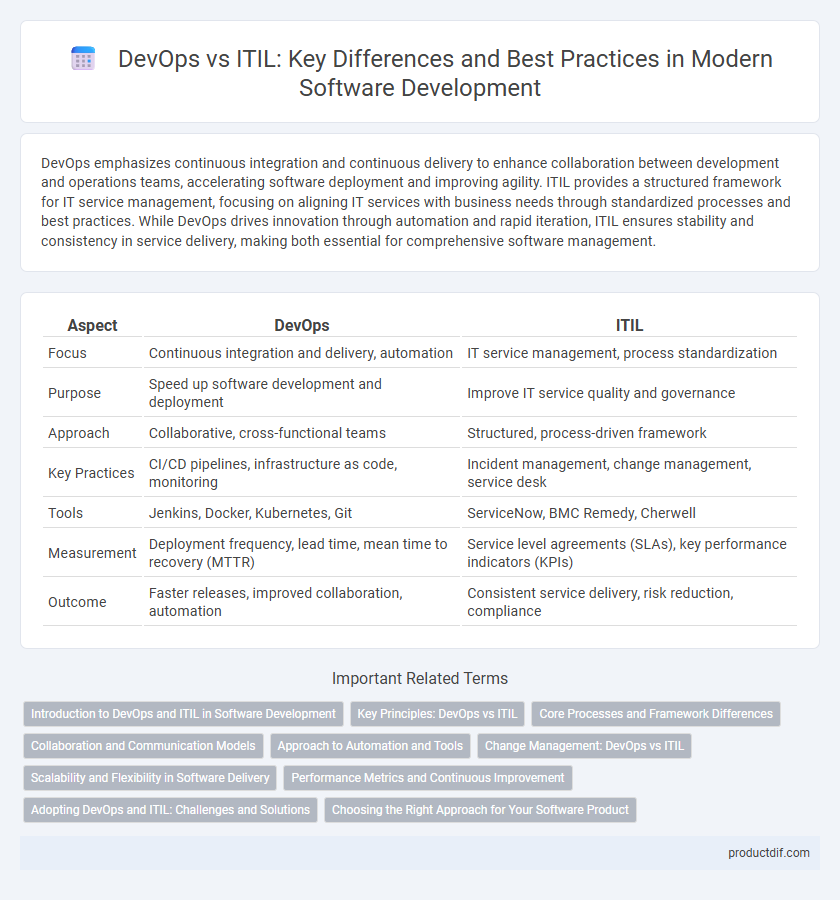DevOps emphasizes continuous integration and continuous delivery to enhance collaboration between development and operations teams, accelerating software deployment and improving agility. ITIL provides a structured framework for IT service management, focusing on aligning IT services with business needs through standardized processes and best practices. While DevOps drives innovation through automation and rapid iteration, ITIL ensures stability and consistency in service delivery, making both essential for comprehensive software management.
Table of Comparison
| Aspect | DevOps | ITIL |
|---|---|---|
| Focus | Continuous integration and delivery, automation | IT service management, process standardization |
| Purpose | Speed up software development and deployment | Improve IT service quality and governance |
| Approach | Collaborative, cross-functional teams | Structured, process-driven framework |
| Key Practices | CI/CD pipelines, infrastructure as code, monitoring | Incident management, change management, service desk |
| Tools | Jenkins, Docker, Kubernetes, Git | ServiceNow, BMC Remedy, Cherwell |
| Measurement | Deployment frequency, lead time, mean time to recovery (MTTR) | Service level agreements (SLAs), key performance indicators (KPIs) |
| Outcome | Faster releases, improved collaboration, automation | Consistent service delivery, risk reduction, compliance |
Introduction to DevOps and ITIL in Software Development
DevOps is a collaborative approach combining software development and IT operations to accelerate delivery, enhance quality, and foster continuous integration and continuous deployment (CI/CD). ITIL (Information Technology Infrastructure Library) provides a structured framework for IT service management, focusing on aligning IT services with business needs through standardized processes such as incident, problem, and change management. In software development, DevOps emphasizes rapid innovation and automation, while ITIL prioritizes stability, governance, and service reliability.
Key Principles: DevOps vs ITIL
DevOps emphasizes continuous integration, continuous delivery (CI/CD), and collaboration between development and operations teams to accelerate software delivery and improve quality. ITIL focuses on structured IT service management processes, including incident, change, and problem management, aiming to align IT services with business needs and ensure reliability. Both frameworks prioritize efficiency but differ in approach: DevOps drives rapid innovation through automation and cultural change, while ITIL enforces standardized, repeatable processes for service stability.
Core Processes and Framework Differences
DevOps emphasizes continuous integration, continuous delivery (CI/CD), and collaboration between development and operations to accelerate software deployment and improve quality. ITIL focuses on structured service management processes such as incident management, change management, and service desk operations to ensure stability and reliability. The core difference lies in DevOps fostering agility and automation, while ITIL prioritizes process governance and standardized service delivery frameworks.
Collaboration and Communication Models
DevOps emphasizes continuous collaboration and communication between development and operations teams through integrated tools like Jira and Slack, fostering agile workflows and rapid feedback loops. ITIL structures communication within defined processes and roles, promoting formalized interaction points and documentation to ensure service management consistency. Both models aim to enhance cross-functional cooperation but differ in flexibility and cadence, with DevOps supporting dynamic, real-time dialogue and ITIL relying on standardized communication channels.
Approach to Automation and Tools
DevOps emphasizes continuous integration and continuous delivery (CI/CD) pipelines, leveraging tools like Jenkins, GitLab CI, and Docker to automate code deployment and infrastructure management. ITIL focuses on standardized processes and service management automation through tools such as ServiceNow and BMC Remedy, prioritizing configuration management and incident automation within IT service operations. While DevOps champions agile, developer-centric automation for faster release cycles, ITIL ensures stable, repeatable automation aligning with IT governance and compliance frameworks.
Change Management: DevOps vs ITIL
DevOps emphasizes continuous integration and continuous delivery (CI/CD) pipelines to accelerate change management, fostering collaboration between development and operations teams for rapid, automated deployments. ITIL focuses on structured, formalized change management processes with defined workflows, risk assessments, and approval gates to minimize service disruptions and ensure compliance. While DevOps prioritizes speed and agility through automation, ITIL emphasizes stability and control through documentation and governance in change management.
Scalability and Flexibility in Software Delivery
DevOps enhances scalability and flexibility in software delivery by promoting continuous integration, automated testing, and rapid deployment pipelines that adapt to changing business needs. ITIL provides a structured framework focused on stability and predictable service management, which can limit immediate scalability but ensures controlled growth. Combining DevOps agility with ITIL governance enables organizations to scale software delivery efficiently while maintaining service quality and compliance.
Performance Metrics and Continuous Improvement
DevOps emphasizes real-time performance metrics such as deployment frequency, lead time for changes, and mean time to recovery (MTTR) to drive continuous improvement in software delivery processes. ITIL focuses on key performance indicators (KPIs) like incident resolution time, service availability, and problem management effectiveness to enhance IT service management. Integrating DevOps metrics with ITIL framework promotes a holistic approach to optimizing performance and fostering continuous improvement across development and operations teams.
Adopting DevOps and ITIL: Challenges and Solutions
Adopting DevOps and ITIL simultaneously presents challenges such as cultural resistance, process misalignment, and tool integration complexities. Overcoming these obstacles requires fostering cross-functional collaboration, automating workflows, and aligning ITIL's structured service management with DevOps' agile practices. Implementing continuous monitoring and using hybrid frameworks can streamline the transition while maintaining control and flexibility in software delivery.
Choosing the Right Approach for Your Software Product
Selecting between DevOps and ITIL for your software product hinges on project goals, team structure, and organizational culture. DevOps accelerates software delivery through continuous integration, continuous deployment (CI/CD), and cross-functional collaboration, making it ideal for dynamic environments requiring rapid updates. ITIL offers structured IT service management with defined processes and best practices, suited for organizations prioritizing stability, compliance, and risk management in software operations.
DevOps vs ITIL Infographic

 productdif.com
productdif.com